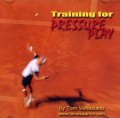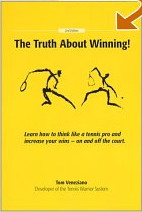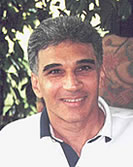In the Tennis Warrior System, mental attitude always comes first. If you want your tennis game to excel, your thinking and your priorities must be right. An important aspect of correct thinking is your ability to accept failures and move on. We all know this one, don't we? Well, there still seems to be some confusion on exactly what this means.
Many players misunderstand the principle behind accepting failures and moving on, and they think it means they should have a cavalier "I don't care" attitude about mistakes and losses. The implication here is that players do not care about failing and it does not bother them. This only leads them to wonder, "How am I going to build mental strength with an indifferent attitude?" Or, "How can I teach my son or daughter to fight, fight, fight with that impassive, nonchalant focus?"
Recently, I was on the court coaching a friend's son. My friend asked me how his son was going to get that extra drive if he is taught to be so relaxed about his failures. The answer involves a threefold approach to establishing the correct mental environment for learning.
1. You are not teaching the player to like or enjoy failure; you are teaching him or her to take responsibility for his or her failure. And coping with each loss or failure rests entirely on his or her mental attitude. All players must understand that blaming everything and everyone for their failures runs counter to a champion's mindset. In my Tennis Warrior system, the Refocus Technique is there to remind you, "The next shot is more important than the last mistake."
2. In match play, you teach a player that the ability to separate quickly from a failure is critical to his or her winning percentage. If a player swings from feeling overly enthusiastic when he or she succeeds, to feeling totally dejected when he or she fails, the player has a problem. Logging too much time in a negative, dejected mindset results in more points lost. On the other hand, logging more time with a positive, upbeat mindset means a higher percentage of points won. To increase the winning percentage, he or she must quickly separate from his or her failures in the match.
3. Establish a week-by-week and month-by-month, intense, disciplined training schedule, and combine that with the practice of accepting failures. Over time, this training regimen will instill in the player a sense of self-discipline, work ethic and a drive to excel. Here we have two sides to the same coin: Accepting failures and moving on is one side of the coin, while an ongoing, intense, disciplined training is the other side of the coin.
Establishing this consistent mental and physical routine has a major effect on a player's mind. Even if the player occasionally has a bad day of practice, the long-term effect is still momentum gained. Players must get accustomed to having a poor practice then moving on. Forging forward relentlessly despite the failures is what creates a great player. They are two sides of the same coin!
Hard work plus mastering the ability to accept your failures and move on is the way to develop mental strength. The cavalier "I don't care" attitude about failures is a misapplication of the true principle, and will indeed lead you to mental weakness.










 You will join 13,000 other subscribers in receiving news of updates to the Tennis Server along with monthly tennis tips from tennis pro Tom Veneziano.
You will join 13,000 other subscribers in receiving news of updates to the Tennis Server along with monthly tennis tips from tennis pro Tom Veneziano. 